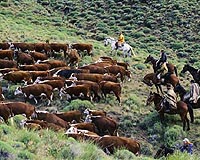 |
Ghazali, Iraq (AFP) Dec 4, 2009 The face of Iraqi farmer Aid Shamkhi darkens as he looks at his parched, weed-strewn ground in the heart of what was once the country's breadbasket. "Everything is dry. I have not grown any rice this year; it's a disaster," he says. Shamkhi owns 125 hectares (313 acres) of farmland outside the village of Ghazali in the rich food-producing province of Najaf, south of Baghdad, where production has fallen with the level of the nearby Euphrates River since the early 1990s. The river that once supplied the rice fields has become a muddy trickle that can now only provide water for a quarter of the arable land. Iraq's Fertile Crescent, which lies between the Euphrates and the Tigris rivers, has been since ancient times a vast breadbasket -- to the point that some believe that within it was the biblical Garden of Eden, the paradise enjoyed by Adam and Eve. But Iraq now imports around 90 percent of its rice, where half a century ago it was an exporter. Shamkhi's farm once provided him with a satisfactory income as he sold his crop to a cooperative at a state-subsidised price. But this year he has planted no wheat and no rice. This year "has been horrible. There's been no rain, and the water levels are very low. Even the migrating birds have not stopped off" for the winter, says the farmer, whose dark complexion contrasts with the pure white of his robes. "We are farmers. We do not need oil," Iraq's most important natural resource. "It is of no use to us. We need our water." Abbas Hammadi, a village elder, agrees. "It is the worst year. Our children are obliged to go and work in town as labourers." In a country where a third of the population depends on farming, there have been water shortages for almost 15 years. Supplies have been hit by drought and by less water flowing into the Tigris and Euphrates from Turkey, which has built a network of dams as part of a massive development project in southeastern Anatolia. Syria's use of water further cuts the flow along the Euphrates while Iran, Iraq's eastern neighbour, has cut the flow of water along tributaries of the Tigris. Added to this is the problem of rising salinity in the soil, which is caused by flooding, a traditional irrigation technique used in Egypt and Iraq, and which has resulted in a marked decline in land that is cultivated. "Once representing the second largest contributor to national GDP, the contribution of agriculture has steadily decreased from nearly nine percent in 2002 to four percent in 2008," the UN Food and Agriculture Organisation said recently. Najaf regional director of agriculture Zuhair Ali Abdel Razzaq said rice lands once covered 50,000 hectares, but that figure has fallen to only 17,250 in recent years. "Imports of rice and other cereals have grown," he adds. According to the ministry of agriculture, the country produced 120,000 tonnes of rice in 2008, but imported 10 times more. That cost 600 million dollars (400 million euros). Today, "agricultural production provides only 30 percent of the country's needs," says Subhi Mansur al-Jumaili, deputy minister of agriculture. For wheat, another major staple of the Iraqi diet, 3.5 million tonnes, or three-quarters of the total consumed, was imported last year. In an effort to raise agricultural output, the ministry launched a huge programme to modernise irrigation practices. "We have a project to irrigate 750,000 hectares through the use of automatic sprinklers, which will halve the amount of water used and reduce the salinity of the soil," Jumaili claims. Researchers are also developing different kinds of cereal that are resistant to the high levels of salt content, and are working to raise the productivity of the soil. But for Aid Shamkhi only one solution can bring an end to the agricultural crisis. "We want Turkey, Syria and Iran to give us our fair share of water." Share This Article With Planet Earth
Related Links Farming Today - Suppliers and Technology
 Paul McCartney has a beef with world climate talks
Paul McCartney has a beef with world climate talksBrussels (AFP) Dec 3, 2009 Ex-Beatle Paul McCartney has a beef with world leaders' efforts to battle global warming, but the vegetarian's solution -- eat less meat -- was not to everyone's taste as he joined a debate at the European Parliament on Thursday. Ahead of global talks on climate change starting in Copenhagen on Monday, the 67-year-old took his international campaign for 'Meatless Mondays' to Brussels -- hoar ... read more |
|
| The content herein, unless otherwise known to be public domain, are Copyright 1995-2009 - SpaceDaily. AFP and UPI Wire Stories are copyright Agence France-Presse and United Press International. ESA Portal Reports are copyright European Space Agency. All NASA sourced material is public domain. Additional copyrights may apply in whole or part to other bona fide parties. Advertising does not imply endorsement,agreement or approval of any opinions, statements or information provided by SpaceDaily on any Web page published or hosted by SpaceDaily. Privacy Statement |